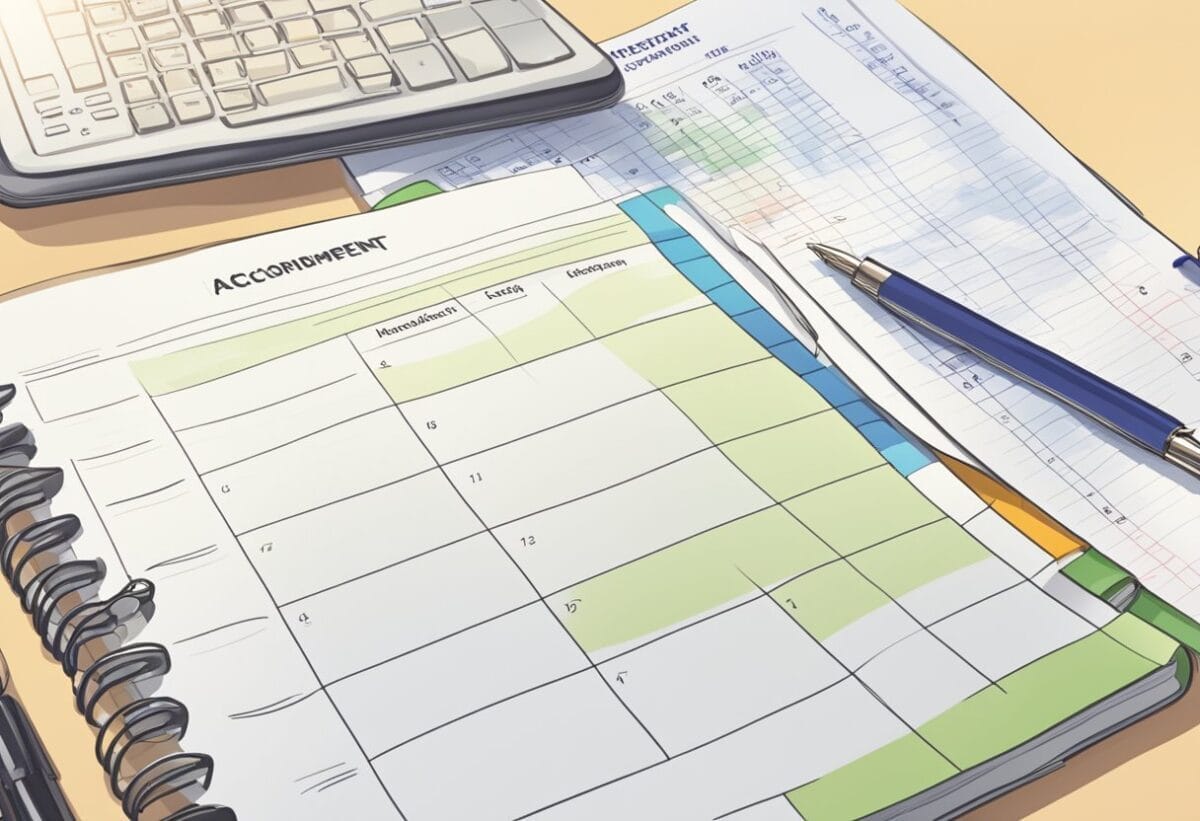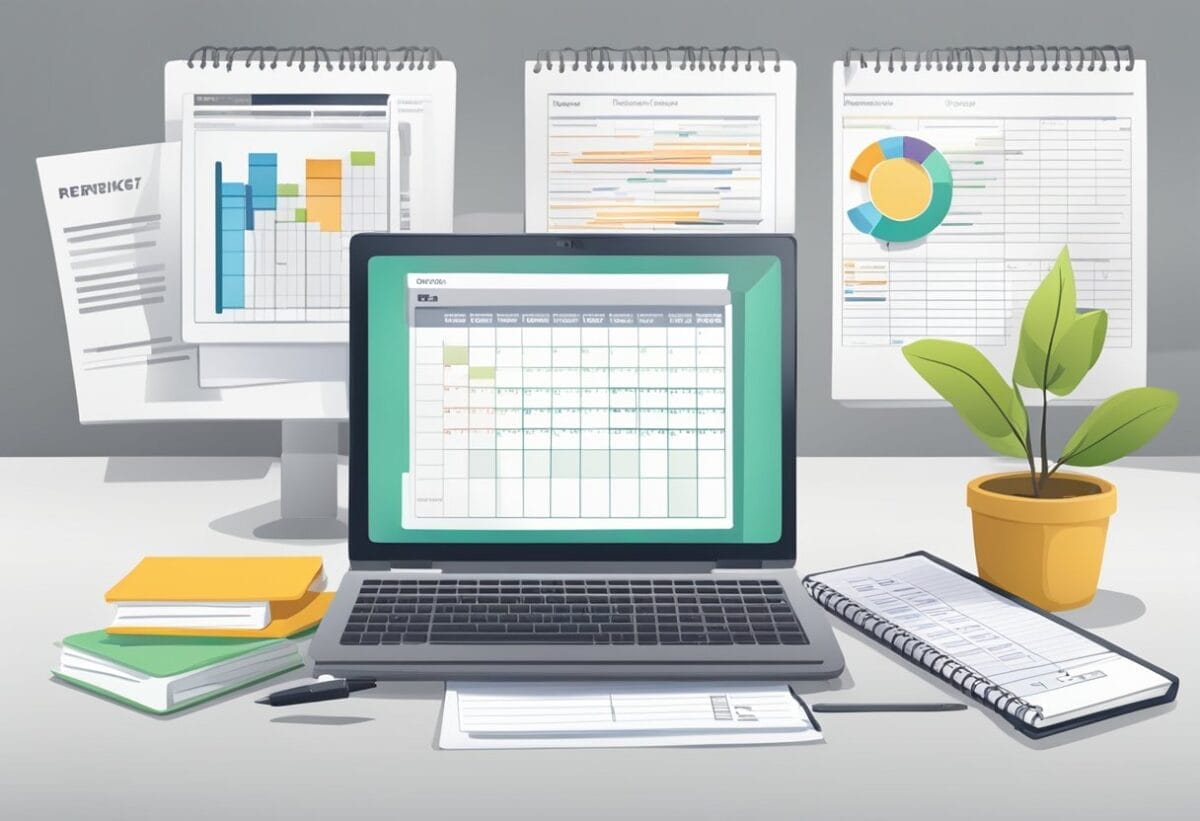A well-prepared performance appraisal can significantly boost your career, helping you to align your professional career growth with the company’s goals.
By understanding your role and the value you add to your team, you can approach the appraisal meeting with confidence.
Performance appraisal meeting is an opportunity to showcase your contributions to the team and articulate your ambitions.
KEY TAKEAWAYS
- Approaching appraisals with a clear understanding of personal achievements enhances professional growth.
- Articulate career ambitions and readiness for feedback to convey commitment.
- Preparation enables an effective dialogue about past contributions and future expectations.
What is The Performance Appraisal Process?
The performance appraisal process is a key component of performance management, crucial for your growth and the company’s success. It shapes your development and fosters two-way communication with your manager.
Objectives of Performance Reviews
Performance reviews are not just a formality; they have clear objectives. Primarily, they aim to:
- Evaluate your job performance against predefined criteria.
- Identify areas for growth to enhance your skills and expertise.
- Boost employee morale by recognizing achievements and addressing concerns.
Through this process, you become aware of where you stand and what paths you can take to advance in your career.
Roles of Employees and Managers
- Your Role: As an employee, your role is proactive. Prepare to discuss your achievements, challenges and be open to feedback. Reflect on your performance and come with a mindset to engage in a constructive dialogue.
- Manager’s Role: Your manager should provide clear and specific feedback that helps you understand your strengths and areas for improvement. They are responsible for creating an environment that encourages open dialogue and supports your professional growth.
Both roles are crucial for a successful performance review.
Importance of Two-Way Conversations
Benefits: Engaging in a two-way conversation turns the review into a dynamic and interactive experience. It allows for a chance for you to voice your thoughts and concerns and a platform for collaborative goal setting.
Goal: The ultimate goal is to ensure that the performance management process is meaningful and leads to tangible outcomes, both for you and the organization.
How to Prepare For Performance Appraisal in Workplace?
Coming prepared to discuss your achievements and future objectives not only demonstrates your commitment but also helps you steer the conversation.
Reflect on past successes and areas for development. Anticipate the expectations and be ready to engage with constructive feedback; this not only shows a willingness to grow but also reinforces your professional maturity.
1. Clarify Your Career Goals (Annual and Beyond)

“What is your 5-years career plan?”
Embarking on your performance appraisal meeting begins with understanding your career trajectory. A clear vision for your future fuels progress and professional fulfillment.
Setting Career Aspirations and Goals
Identify where you envision your career in the upcoming year—and in the years to follow. Reflect on these points:
- Aspirations: What position do you aim to hold? What type of projects would you like to lead?
- Skills: What new abilities will aid your advancement?
- Contributions: How do you plan to add value to your team or company?
- Milestones: Set tangible, time-bound targets to guide your growth.
Now, craft your aspirations into SMART goals—Specific, Measurable, Achievable, Relevant, and Time-bound. These will serve as your roadmap.
For example:
- By Q4, master advanced data analysis to enhance departmental reporting.
- Lead a cross-department project by next June to build leadership skills.
Approach your appraisal with these thoughtfully curated goals. They demonstrate ambition and readiness for personal development.
It’s about paving a path that aligns with both your values and career aspirations. Your evaluator will see the clarity in your vision, making it easier to support your journey.
2. List Out Your Accomplishments You’ve Achieved This Year

Preparing for your performance appraisal meeting requires a clear assessment of your annual achievements. Reflect with precision on your successes and their impact on your professional growth.
Reviewing Performance Metrics
Begin by examining the quantitative measures of your work.
Look at the targets set at the start of the year and assess which ones you’ve met or surpassed.
For example if your role involves sales, delineate the increase in sales you generated.
Align these figures with your personal development and career aspirations to demonstrate progression.
- Sales targets exceeded by 15%
- Customer satisfaction score: 92%
- Project deadlines met: 100%
Self-Evaluation and Reflection
Focus next on self-evaluation. This is where you gauge the quality of your performance beyond mere numbers.
Identify strengths and weaknesses openly to show self-awareness.
Maybe your creative problem-solving led to innovative solutions, or perhaps your leadership skills shone in team collaborations.
Acknowledge the areas where growth is needed and tie them to actionable personal development plans.
- Strengths: Innovative, collaborative leadership
- Weaknesses: Time management in high-pressure contexts
3. Prepare for Questions That May Be Asked

In preparation for the performance appraisal meeting, it’s vital to anticipate questions and structure your responses. Reflect on your accomplishments and areas for growth to communicate effectively.
Sharing Achievements and Challenges
Achievements: List your major accomplishments since the last review. Be ready to describe each with specific examples, metrics, and how they align with the team’s goals.
- Achievement 1: Increased sales by 20%.
- Achievement 2: Streamlined project delivery, reducing lead times by 30%.
Challenges: Identify the challenges you faced and how they were addressed. Link these to learning experiences or areas where you seek further improvement.
- Challenge 1: Overcoming limited resources to meet project deadlines.
- Challenge 2: Adaptation to new software, now proficient.
Receiving and Giving Feedback
Receiving Feedback: Welcome feedback positively, even if it’s critical. Show that you understand by summarizing the points and discuss how you plan to act on them.
- Example Response: “I appreciate your insights on …, and here’s my plan to improve […].”
Giving Feedback: If it’s part of your review, think about constructive feedback. Be respectful and offer clear examples.
- Example Comment: “I’ve noticed […], and it might help if we […].”
Discussing Professional Growth and Development
Career Goals: Share your long-term professional ambitions. Explain how your goals align with the company’s direction.
- Career Goal: “My aim is to advance to a leadership role, contributing to strategic decisions that affect our market position.”
Self-Evaluation: Gauge your performance using self-evaluation tools provided by the company or your own assessment.
- Personal Metric: “Based on the targets set out, I’ve exceeded by 10% in […].”
4. Plan (at least) One Thing You Want to Achieve in the Coming Year

When preparing for your performance appraisal meeting, it’s pivotal to set forth clear goals.
Think about what you’re passionate to accomplish in the year ahead. This strategic vision is not only motivating but also gives you and your appraiser a tangible target to assess your progress.
Objective Setting
Your objective should be SMART:
- Specific: Precisely what you aim to achieve.
- Measurable: Concrete criteria to measure progress.
- Attainable: Realistically achievable within a year.
- Relevant: Aligned with broader career aspirations.
- Time-Bound: Has a clear deadline.
Example Goal
| Goal Area | Description |
|---|---|
| Professional Development | Enhance your leadership skills by completing a management course. |
Action Plan
Break down your goal into steps:
- Research suitable courses by Q2.
- Enroll and start the course by Q3.
- Set milestones for course progression.
- Apply learned skills in team projects.
5. Be Ready to Receive and Engage with Feedback (Positive and Negative)

Feedback is a vital part of any performance appraisal. Embrace this opportunity with an open mind.
Timely and honest feedback can drive high levels of employee engagement. Here’s how you can prepare:
- Listen Actively: Nod your head, make eye contact and avoid interrupting.
- Reflect on Feedback Provided: Take notes, consider the points made and ask clarifying questions.
- Demonstrate Your Commitment: Acknowledge the feedback received and show gratitude for the constructive input.
- Plan Your Response: Be thoughtful and communicate your action plan.
- Maintain a Positive Attitude: Approach the session as a learning experience, stay composed and professional.
Your Next Steps After the Appraisal Meeting

After your performance appraisal session, your focus should shift to turning feedback into action and growth. It’s time to harness the insights gained to elevate your performance and prepare for future opportunities.
1. Create an Action Plan for Improvement
Draft a clear action plan based on the feedback.
Prioritize areas needing improvement and set specific, measurable goals.
For example, if time management was a noted concern, you could aim to decrease distractions and set daily task lists.
Documenting your effort in a structured manner can significantly enhance your ability to track progress.
2. Adopt Positive Reinforcement and Stay Motivated
Post-appraisal, keep morale high by celebrating improvements, no matter how small.
Use positive reinforcement to stay motivated.
Each step forward takes you closer to realizing your potential and is a stride towards future promotions.
Always acknowledge the hard work you’re putting in—it’s the fuel for your career journey.
3. Learn From Your Feedbacks and Plan for Future Success and Promotion
Take your appraisal feedback as a wealth of learning opportunities.
Reflect on constructive comments to steer your career path intentionally towards future success.
Strategize how you can leverage your strengthened capabilities for new roles or responsibilities, keeping long-term goal-setting in mind.
Aim high and prepare diligently for your next performance milestone.
5 Top Performance Review Preparation Tips

Preparing effectively for your performance appraisal meeting can significantly influence your professional development. It’s an opportunity to showcase your achievements and exhibit your commitment to ongoing growth.
1. Focus on specific contributions you’ve made
Reflect on your significant achievements and how they’ve benefited the team or company.
Present concrete examples that highlight your input and the positive outcomes resulting from your efforts.
2. Leverage on your co-worker’s feedback
Gather feedback from colleagues to get a well-rounded view of your performance.
Positive comments can bolster your case, while constructive feedback provides insights into areas of improvement and how you address challenges.
3. Show examples on how you have worked to improve yourself
Discuss specific instances where you’ve taken feedback to heart and turned it into action.
This shows dedication to professional growth and an understanding that there’s always room for development.
4. Don’t play defense even if you don’t agree with the performance evaluation
Listen openly to evaluations, even if they’re unexpected.
Respond with professionalism, seeking clarity and ways to improve, rather than disputing the assessment.
5. Track your progress to prepare for your next performance review
Keep a record of your performance goals, the steps you’ve taken toward achieving them, and any obstacles you’ve encountered.
This will not only prepare you for the next appraisal but also keep you motivated to continuously push your limits.






